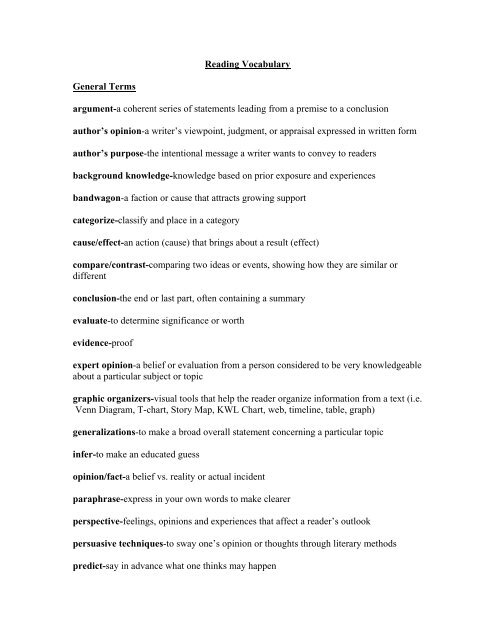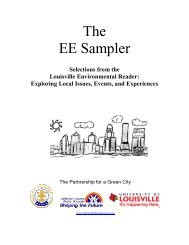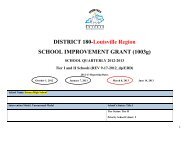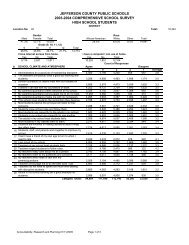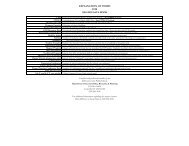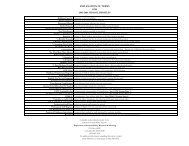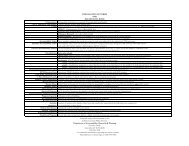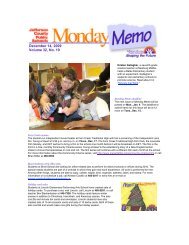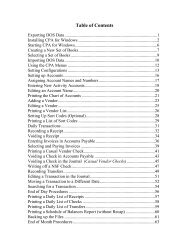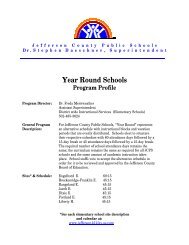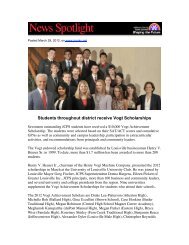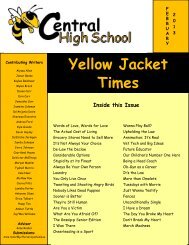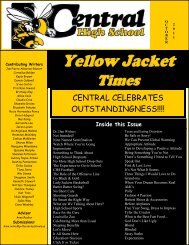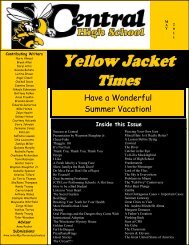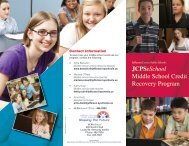Reading Vocabulary General Terms argument-a coherent series of ...
Reading Vocabulary General Terms argument-a coherent series of ...
Reading Vocabulary General Terms argument-a coherent series of ...
You also want an ePaper? Increase the reach of your titles
YUMPU automatically turns print PDFs into web optimized ePapers that Google loves.
<strong>Reading</strong> <strong>Vocabulary</strong><br />
<strong>General</strong> <strong>Terms</strong><br />
<strong>argument</strong>-a <strong>coherent</strong> <strong>series</strong> <strong>of</strong> statements leading from a premise to a conclusion<br />
author’s opinion-a writer’s viewpoint, judgment, or appraisal expressed in written form<br />
author’s purpose-the intentional message a writer wants to convey to readers<br />
background knowledge-knowledge based on prior exposure and experiences<br />
bandwagon-a faction or cause that attracts growing support<br />
categorize-classify and place in a category<br />
cause/effect-an action (cause) that brings about a result (effect)<br />
compare/contrast-comparing two ideas or events, showing how they are similar or<br />
different<br />
conclusion-the end or last part, <strong>of</strong>ten containing a summary<br />
evaluate-to determine significance or worth<br />
evidence-pro<strong>of</strong><br />
expert opinion-a belief or evaluation from a person considered to be very knowledgeable<br />
about a particular subject or topic<br />
graphic organizers-visual tools that help the reader organize information from a text (i.e.<br />
Venn Diagram, T-chart, Story Map, KWL Chart, web, timeline, table, graph)<br />
generalizations-to make a broad overall statement concerning a particular topic<br />
infer-to make an educated guess<br />
opinion/fact-a belief vs. reality or actual incident<br />
paraphrase-express in your own words to make clearer<br />
perspective-feelings, opinions and experiences that affect a reader’s outlook<br />
persuasive techniques-to sway one’s opinion or thoughts through literary methods<br />
predict-say in advance what one thinks may happen
pro/con-for or against<br />
retell-to tell orally or in writing what is remembered from the text<br />
scan-to glance at quickly while looking for key information<br />
sequence-one thing after another in a logical order<br />
skim-quickly read through a text to get the main idea <strong>of</strong> the passage<br />
statistics-data collected to determine a mathematical value<br />
summarize-briefly state the main points<br />
supporting details-facts that support an author’s written statement or opinion<br />
supporting evidence-statements <strong>of</strong> pro<strong>of</strong><br />
testimonial-a statement testifying to benefits received<br />
theme (topic)-the big idea <strong>of</strong> a story, which connects the characters, setting, and plot<br />
Genres <strong>of</strong> <strong>Reading</strong><br />
advertisement-the act or process <strong>of</strong> promoting a product or thought<br />
brochure-a pamphlet containing descriptive advertising material<br />
consumer text-reading materials designed to inform consumers concerning a particular<br />
subject or product<br />
directions-instructions or guidance pertaining to a particular task<br />
electronic text-reading materials that are accessed via email or Internet services<br />
essay-an analytic or interpretative literary composition<br />
form-a prescribed set order <strong>of</strong> words<br />
genre-type <strong>of</strong> text<br />
letter-a personal, written form <strong>of</strong> communication<br />
literary (fiction)-a narrative that is imagined (i.e. historical fiction, folklore, short story)
magazine article-a written article that entertains and /or informs readers and has been<br />
published in a magazine<br />
manual-a book <strong>of</strong> instructions<br />
memo-a written reminder<br />
newspaper article- a written article that entertains and /or informs readers and has been<br />
published in a newspaper<br />
nonfiction-factual information about real people, places or events<br />
novel-a written narrative that is long and complex and deals with human experience<br />
through a connected sequence <strong>of</strong> events<br />
opinion column-a written narrative found in newspapers and/or magazines that allows<br />
for personal expression <strong>of</strong> one’s thoughts and opinions<br />
persuasive-text that convinces you to believe something<br />
play-the stage representation <strong>of</strong> an action or story<br />
poetry-a piece <strong>of</strong> literature written in verse<br />
practical/workplace-information for authentic purposes (i.e. directions, letters,<br />
schedules, recipes, job applications)<br />
proposal-an act <strong>of</strong> stating something for consideration, an <strong>of</strong>fer<br />
recite-to repeat from memory, or read aloud publically<br />
schedule-a procedural plan<br />
script-the written text <strong>of</strong> a stage play, screenplay, or broadcast<br />
short story-a brief account <strong>of</strong> incidents or events<br />
speech-the communication or expression <strong>of</strong> thoughts in spoken words<br />
warranty-something that authorizes, sanctions, supports, or justifies<br />
Literary Devices and <strong>Terms</strong><br />
alliteration-repetition <strong>of</strong> the first sound in words
dialogue-characters’ conversation in a story<br />
foreshadowing-giving a sign or suggestion <strong>of</strong> what will happen later in a story<br />
form-a particular style <strong>of</strong> poetry (i.e. free verse, limerick, cinquain)<br />
hyperbole-figure <strong>of</strong> speech that exaggerates the truth<br />
imagery-creating mental pictures from descriptive words<br />
metaphor-a word for one idea or thing is used in place <strong>of</strong> another to suggest a likeness<br />
between them "the ship plows the sea"<br />
monologue-a long speech given by one person without interruption<br />
narrator-the one who is telling a story<br />
personification-a figure <strong>of</strong> speech in which an object has the qualities <strong>of</strong> a person<br />
script-the text <strong>of</strong> a play, broadcast, or movie<br />
simile-a comparison between two unlike things <strong>of</strong>ten using the words like, as, seems,<br />
appears and resembles<br />
stanza-a part <strong>of</strong> a poem with two or more lines that has a common, repeated pattern <strong>of</strong><br />
rhythm or rhyme<br />
story structure-stories have a beginning, middle and end<br />
Non-fiction <strong>Terms</strong><br />
article-a written work <strong>of</strong>ten appearing in magazines or newspapers that presents factual<br />
information<br />
bold-faced type-type with thick, heavy lines<br />
caption-a brief title or explanation that describes an illustration<br />
chart-a sheet giving information in tabular form<br />
diagram-a drawing that shows arrangement and relationships<br />
format-a general plan <strong>of</strong> organization, arrangement, or choice <strong>of</strong> material
glossary-a list <strong>of</strong> words and their definitions <strong>of</strong>ten found at the back <strong>of</strong> a book<br />
headings-titles within an article that identify each new topic<br />
index-an alphabetized listing <strong>of</strong> terms or subjects that gives the page number where each<br />
item can be found in the text<br />
italics-a style <strong>of</strong> printing with letters slanted to the right<br />
key words-vocabulary that is important in comprehending the text<br />
layout-the plan, design, or arrangement <strong>of</strong> something<br />
Table <strong>of</strong> Contents-a listing <strong>of</strong> titles or broad topics <strong>of</strong> information found within the text<br />
text features-the printed layout or design <strong>of</strong> a book or article<br />
Story Elements<br />
characters-people or animals in a story<br />
conflict/solution-a resolution <strong>of</strong> a problem<br />
plot-a description <strong>of</strong> the action in a story; what happened to whom and why<br />
point <strong>of</strong> view-a position from which something is considered or evaluated<br />
setting-the time and place a story occurs<br />
theme-a specific and distinctive quality, characteristic, or concern<br />
Text Connections<br />
text to text connections-connecting common themes between texts<br />
text to self connections-relating the text to our own life experiences<br />
text to world connections-relating the text to world events<br />
<strong>Vocabulary</strong> Instruction<br />
antonym-a word or phrase having the opposite meaning <strong>of</strong> another word or phrase
compound words-two words put together to make one word<br />
homonyms-words that sound alike but are spelled differently and have different<br />
meanings<br />
prefix-the syllable at the beginning <strong>of</strong> a word that changes the meaning <strong>of</strong> the word<br />
suffix-the syllable at the end <strong>of</strong> a word that changes the meaning <strong>of</strong> the word<br />
synonym-a word or phrase having about the same meaning as another word or phrase


